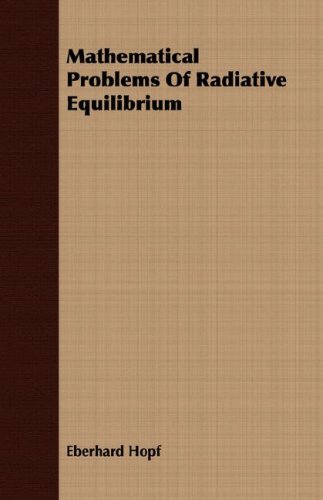
Mathematical Problems Of Radiative Equilibrium
by Eberhard Hopf
Publisher: Cambridge University Press 1934
Number of pages: 123
Description:
Schwarzschild's classical work on absorption and diffusion in the sun's atmosphere, and the continuation of these investigations through A. Eddington, J.H. Jeans, R.A. Milne and others, have rendered the theory of radiative equilibrium a definite chapter of mathematical astrophysics. Besides the known results (theory of Milne's standard model, infinitely deep slab with no radiation incident on its surface) the reader will also find more or less detailed discussions of other models.
Download or read it online for free here:
Download link
(multiple formats)
Similar books
 Black Holes
Black Holesby P.K. Townsend - arXiv
Notes for a course taught in part III of the Cambridge University Mathematical Tripos: gravitational collapse, Schwarzschild black hole, charged black holes; rotating black holes; energy and angular momentum; black hole mechanics; Hawking radiation.
(17336 views)
 Neutrinos and the Stars
Neutrinos and the Starsby Georg Raffelt - arXiv
The role of neutrinos in stars is introduced for students with little prior astrophysical exposure. We begin with neutrinos as an energy-loss channel in ordinary stars and how stars provide information on neutrinos and possible other particles.
(8890 views)
 Radiative Gas Dynamics
Radiative Gas Dynamicsby David Weinberg - Ohio State University
This course is a graduate-level introduction to gas dynamical processes in astrophysics. Its goal is to teach you the basic concepts and equations of gas dynamics and to illustrate the application of gas dynamics to astrophysics.
(11372 views)
 Introduction to Non-Baryonic Dark Matter
Introduction to Non-Baryonic Dark Matterby Paolo Gondolo - arXiv
These lectures on non-baryonic dark matter discuss the need for non-baryonic dark matter in light of recent results, and present some of the most popular candidates for non-baryonic dark matter - neutrinos, axions, neutralinos, etc.
(11418 views)